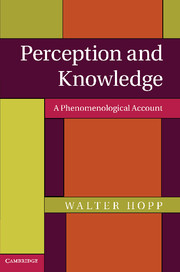Book contents
5 - Conceptual and nonconceptual content
Published online by Cambridge University Press: 21 April 2011
Summary
In the previous three chapters, I have considered and rejected several arguments for experiential conceptualism, and provided several arguments that the intentional and epistemic properties of perceptual experiences cannot be explained in terms of whatever conceptual contents they might reasonably be thought to possess. It might be thought that this straightforwardly entails that perceptual experiences have nonconceptual content, and my own use of the term ‘intuitive content’ might reinforce that conviction. However, it does not. It might turn out that perceptual experiences have no kind of content at all. In this chapter and the next I will argue against that view. It is my contention that perceptual experiences not only have nonconceptual content, but that they have two distinct but necessarily related kinds of nonconceptual content: intuitive contents and horizonal contents.
NONCONCEPTUAL CONTENT
The current literature on nonconceptual content is a mess. Some of this can be chalked up to the already discussed ambiguities surrounding the notion of mental content. Some of it can be chalked up to the fact that the term ‘nonconceptual content’ tells you what this type of content is not, and there are perhaps many sorts of contents that conceptual content is not. Some of it can be chalked up to the inexplicable fact that almost no one provides a definition that is based on independent definitions of the terms ‘content’, ‘concept’, and the prefix ‘non’.
Information
- Type
- Chapter
- Information
- Perception and KnowledgeA Phenomenological Account, pp. 130 - 148Publisher: Cambridge University PressPrint publication year: 2011
